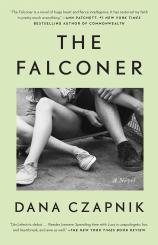The Falconer
Review
The Falconer
“I fell in love with a boy,” proclaims THE FALCONER’s protagonist and narrator, Lucy Adler, “and he didn’t love me back, and that’s pretty much the whole story.” This quote comes late in the game, but that’s not all there is to Dana Czapnik’s debut novel. It is as close as you can get to an inciting incident --- though really, there isn’t one. This is a slice-of-life story, a story of intense rumination and inner struggle, a story of a girl just…living her life.
What makes it interesting is that Lucy lives in New York City in the early ’90s. She’s a high school senior before I was even born, but Czapnik makes the time and place feel tangible. The fact that I live near and work in the city helps, but nonetheless, as in all great stories about the Big Apple, it is its own living, breathing character, taking a backseat only to Lucy herself.
The story opens with a basketball game. Not being a fan of sports in general, I was prepared to roll my eyes and painfully slog through the remaining 200-plus pages, but au contraire. Lucy’s first-person narration kept me hooked. At least for a little while.
"[A]s a celebration and a critique of life, love, and what it is to be a woman and a person on planet Earth, this book has a lot to say, all of which Czapnik says with a deftness and uniqueness I’ve not seen much elsewhere."
As I said, THE FALCONER is very much a story that centers on internal strife, and there’s nothing intrinsically wrong with that. In fact, I personally love following a character’s thoughts. Do they think like me? Or is their thought process completely foreign? Either one can be engaging if done well. Lucy’s narration --- for me --- sat somewhere on the periphery between those two modes (which are, I must point out, extremely generalized). There were moments when I nodded, going, “Yeah, I get that,” and others when I felt my eyes glazing over. That sort of half-and-half became more unbalanced as the story went on, leaning more towards the I-can’t-relate-but-that’s-cool side. But then Lucy began to falter. She started to become not uninteresting, but inconsistent with herself, which is far worse.
Now, this can be chocked up to one of several things. For one, maybe my being a guy caused a disconnect, but I really don’t think that’s it. I’m not the kind of person to go, “Women, am I right?” and shake them off. That’s wrong on so many levels --- levels that are better discussed outside of this innocent little book review. I’ve read plenty of books with female protagonists that I’ve thoroughly enjoyed: Brandon Sanderson’s MISTBORN, Tillie Walden’s ON A SUNBEAM and Madeline Miller’s CIRCE are three of many examples I can think of off the top of my head. Another possible culprit: Czapnik lost sight of the character and began injecting her own philosophy into Lucy’s system, using the character as a vehicle. I don’t think that’s it either, though, because it was all told in a very Lucy way --- thoughtfully acerbic, you could call her style. Czapnik being a talented writer certainly helps; her prose is varied and written in a very readable way.
What I think it really is is this: being a slice-of-life story, there’s no end game, and so it’s very easy to meander in the swirling pool of Lucy’s unconscious. If that was the point and I just missed it, then that’s on me. But I’m reviewing this book from my point of view, reaching into my own swirling pool of unconsciousness, pulling out what I can find, and piecing it together as coherently as I can. (Hypocritical? Maybe.) And from my point of view, Lucy’s tendency as the book progresses to contradict one thought with another became very unnerving. I found myself asking “What’s going on? What do you really believe?” more and more with time.
There’s a passage late in the book, for instance, in which Lucy is talking about someone jumping in front of the subway. She goes beyond depressing and becomes almost nihilistic about it, then rounds everything out with a sudden twinge of hopefulness --- a jarring transition. Sure, people can contradict their own thoughts, but this happened so often for Lucy that she became as hard to grasp as an eel, slipping from thought to thought with reckless abandon. One could argue that this makes her more real, but when the book ends and I still don’t know who Lucy is, I don’t consider it a good thing.
In spite of all this, I wouldn’t say that Lucy doesn’t have her moments, and THE FALCONER is a solid read because of that. Objectively --- if such a descriptor can be attached to anything of this nature --- it’s more than solid. It’s not the kind of book I usually read, so I guess it didn’t strike me in the way it was “supposed” to. But as a celebration and a critique of life, love, and what it is to be a woman and a person on planet Earth, this book has a lot to say, all of which Czapnik says with a deftness and uniqueness I’ve not seen much elsewhere.
Reviewed by Benny Regalbuto on February 1, 2019
The Falconer
- Publication Date: October 8, 2019
- Genres: Fiction
- Paperback: 304 pages
- Publisher: Washington Square Press
- ISBN-10: 1501193236
- ISBN-13: 9781501193231




